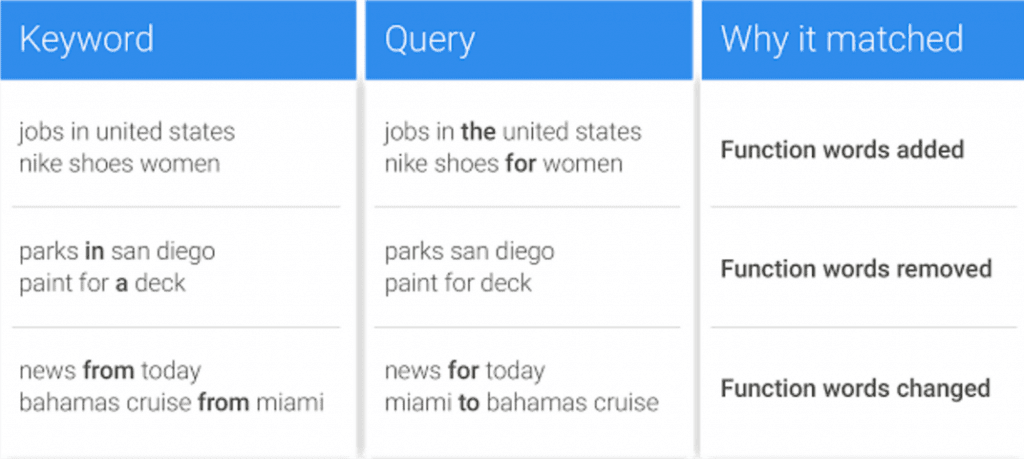Google’s Exact Match Update
When it comes to the world that is digital marketing, there are a few things that all marketers know to be universally true. One, that PPC and CPC are not the same thing. Two, that AdWords offers three distinct types of campaigns: broad, phrase, and exact. And three, an ad with exact match keywords is only triggered when a search query is precisely the same as the keyword. So what happens when the very definition of exact no longer applies to ‘exact match keywords’?
On March 17th, Google expanded the function of exact match keywords to include close variants by additional rewording and reordering of keyword phrases. These variants will be realized by adding or ignoring certain search words, reordering the search words, or reordering the entire keyword structure itself. Two years ago, Google made its first move to close variations for exact match keywords by enabling plurals and misspellings. We didn’t see much change in PPC from this update, but now the implications are huge.
“Won’t changing an exact match keyword to a close variant potentially cause my ad to show for something unrelated?”
Google has declared that keywords won’t be reordered to match with a query when it changes the original meaning of those keywords.
The first instance of Google determining close variants is by adding or ignoring function words to the keyword. Function words are things like prepositions, conjunctions, and articles that don’t have an impact on the core meaning of the keyword. The phrase “texas rodeo in dallas” is no different from “texas rodeo dallas” in that the content the query is searching for is the same. The word “in” is unnecessary to the phrase so Google will now match your ad with both of these keywords even if you only have one in your keyword list. Function words may also be changed, but only if the context remains consistent. A query for “flight to New York” is very different from “flight from New York”, so Google would not make the exchange. Below are examples of each type of change Google could make to function words in an exact match keyword phrase:

The second instance Google will use to calculate close variations is the reordering of words within an exact match keyword. In most cases the order of the individual words themselves is unimportant in determining the intent of the query, it is the actual words themselves.The searches “baseball hats” and “hats baseball” are both looking for the same product despite their inverse wording. Additional examples of this variation style from Google are:

The Impact
There are millions of queries made a day on Google, and while many of them may have slightly different syntax, they are searching for the same thing. This update was made to service the three groups of people using Google- marketers, companies, and customers.
The impact for marketers at agencies like Enilon is that we can better utilize our time since we don’t need to spend hours building out keywords lists with every possible slight variation. The impact for customers on Google is that they can now connect to a wider variety of results and companies based on the same search query, giving them more information than before.
But perhaps the biggest impact lies with the companies that are advertising on Google. They are now reaching a larger pool of customers because their ads will display more frequently, due to the fact that they now match with a greater amount of keywords. They also may now reach potential customers in new markets that their keyword previously prevented them from accessing. Here at Enilon, we are excited that we now have the capabilities to broaden the reach of our clients and continue to grow their customer base. At the end of the day, this expansion is a tool that we can employ to better achieve our client’s goals.
The Steps
Now that close variations have been actively running on Google for a few weeks, we have had time to analyze its effect on our marketing technique. From our analysis, we have come up with a list of steps that we recommend you take when approaching exact match keywords for the most effective optimization.
- Look at your existing exact match keywords and create as many close variations as you can that have the same intent you would like associated with your account.
- Google has stated that AdWords will still prefer to use those keywords identical to search queries
- Exact match keyword phrase entered in your account will match with your ad before Google looks for close variants, so it is best to spend the time adding them up front.
- This will boost your likelihood of displaying and matching with the proper queries, which increases your chance of conversion
- Run in depth SQR’s on all campaigns to see what additional close variants of your exact match keywords Google is using to display your ads.
- Review the variations to determine if the loss or addition of function words, or a word reordering changes the meaning of the query.
- If there’s no difference in the meaning of the variation from the original you should add it as an exact match keyword to maximize match capacity
- If there is a difference in the meaning of the variation from the original you should enter it as a negative keyword
- This will give you some control in preventing wasted spend on unrelated queries that Google might match to your ad
- Consistently run an SQR for your accounts during the first few months to see what additional close variations Google is displaying your ads for. Do this until you feel comfortable with the new extension.
If you want to know more about this exact match expansion, or how Enilon can help you make the most of it for your company, contact us today!
This blog post was written by Enilon’s Manager of Digital Advertising, Rebecca Elliott.


